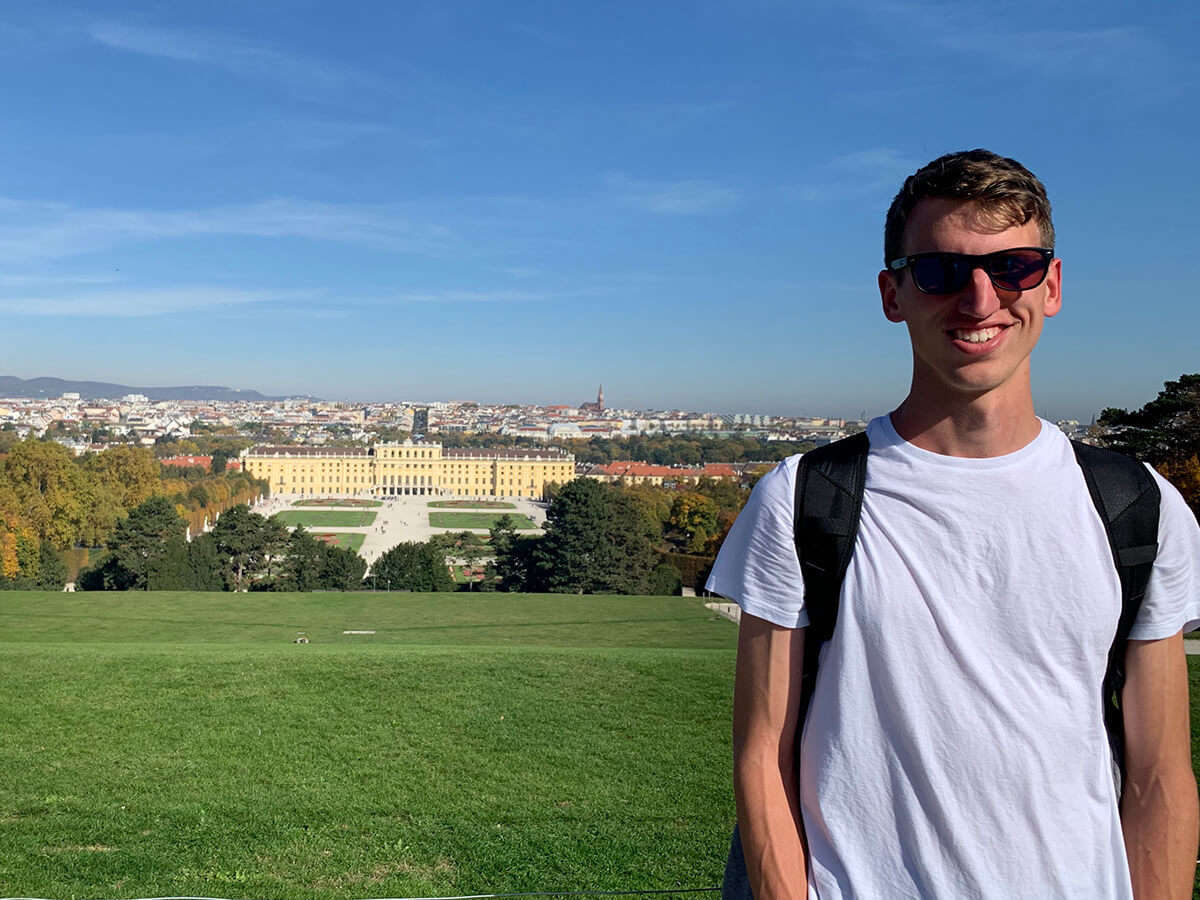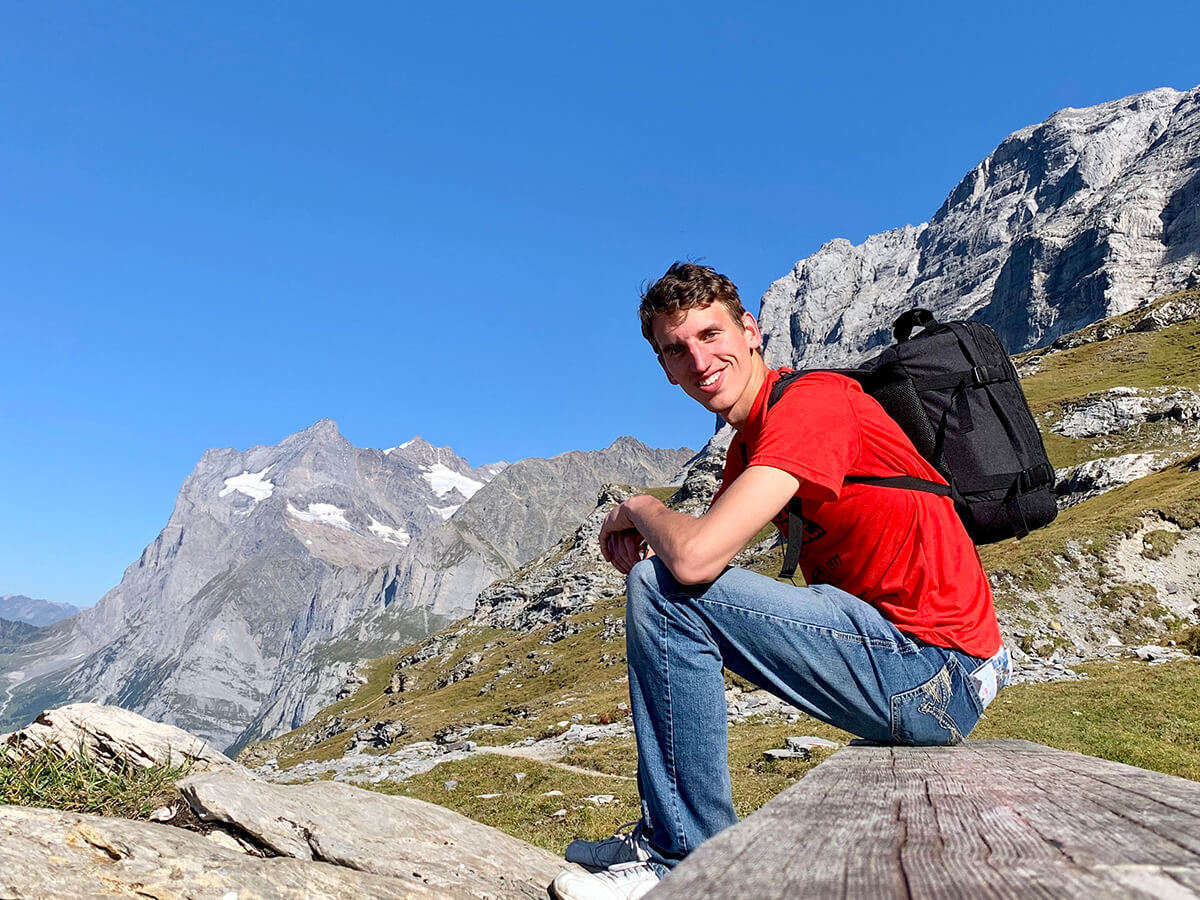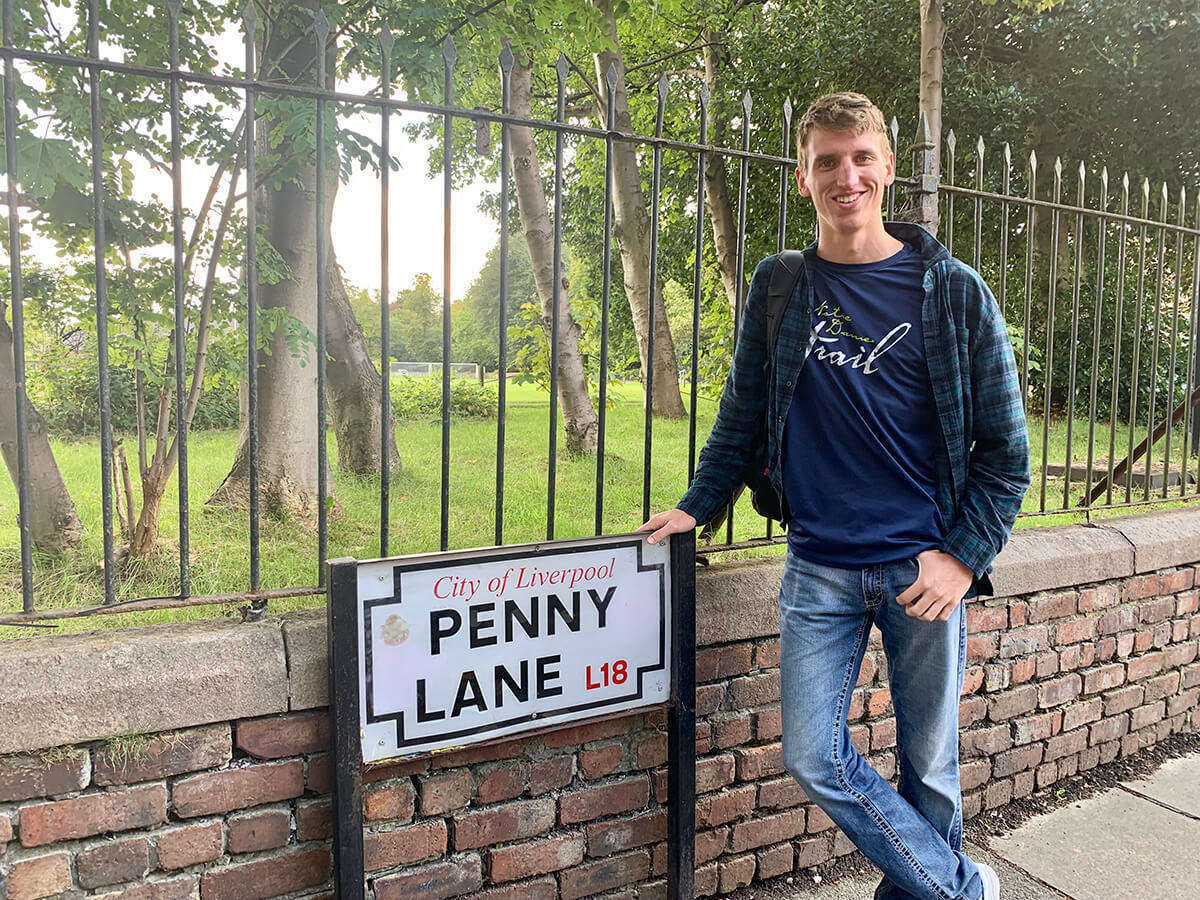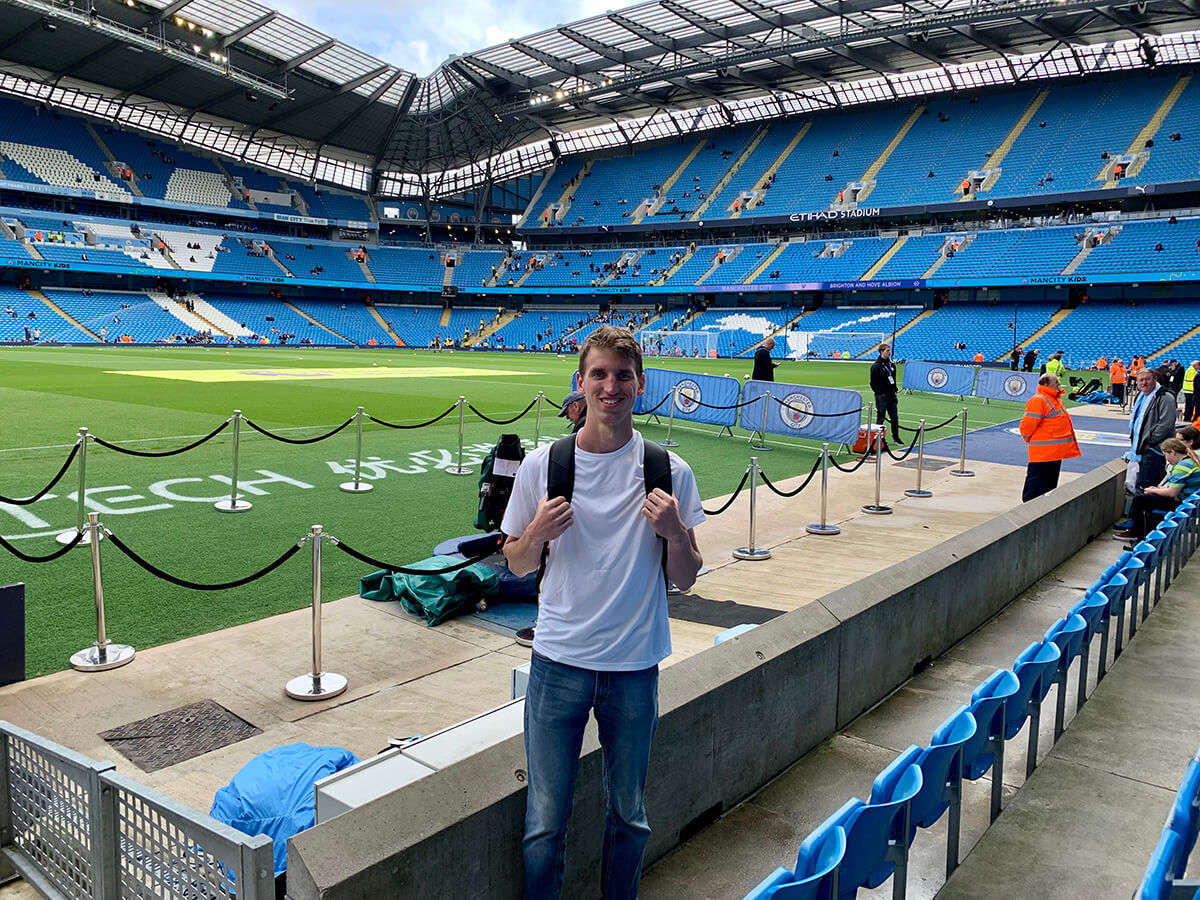Beauty in the aging hands of strife: A reflection on “Every Street”

Joe Andrews studied in London during fall 2019, and he spent fall break visiting some of Europe's capital cities. Like most students, he was struck by the beauty and history he encountered on his trip, but he also noticed the poverty and deprivation that often lives beneath the surface of these tourist hotspots. In order to process this realization, Andrews turned to music; writing and recording the song "Every Street." Here is his account of how this song came to be.
If I could describe my study abroad fall break plan in four words, they would be “ambitious,” “exhausting,” and “refreshingly naive.”
Over the course of 10 days, alone and armed only with a backpack of clothes and a Eurail pass, I was going to traverse through Amsterdam, Berlin, Prague, Budapest, Vienna, and Rome before flying back to London out of Milan. It was a self-guided tour of all the European cities. I didn’t have time to devote a whole weekend to it, yet desperately wanted to see and could conveniently fit on one train route (if you didn’t mind sleeping on trains). I fully expected to return with an Instagram-ready camera roll and enough crazy memories to keep my morale high for the remaining eight weeks of class. I didn’t expect to return with an experience that completely transformed the way I viewed these European capitals.
I’m a songwriter and always have been. That doesn’t mean I’ve always been a good one; there’s plenty of lyric sheets from grade school in my bedroom that I’d rather swallow whole than have to read again. But songwriting is the way I digest and make sense of the world around me. Whether it’s dealing with girl problems, tempering young adult angst, or coming to terms with a world that isn’t the idealized place my brain thinks it is, writing songs helps me give order to emotions by arranging them into words and chords.
And although I consciously decided to take a break from music while abroad — there’s no point in traveling to Europe if you spend every afternoon with a guitar in your bedroom — I’m almost always working on something. Much like how the wand chooses the wizard in Harry Potter, songs can choose the songwriter, and inspiration can strike at the strangest moments. For example, while bumbling around Manchester on a weekend trip early in my semester, I stumbled across a road named “Every Street.” I thought it would be a really clever song title, perhaps something about Manchester’s sultry nightlife scene. I stuck the idea in my mental back pocket to simmer for a while.
When I arrived in Amsterdam to start my fall break trip a few weeks later, the song was still in this nebulous form. I had a few melodic ideas and a great opening line: Oh, the red lights down on Every Street are howling tonight. Beyond that, I was staring at a blank slate. I was still waiting for my wand to choose me.
Within a few hours of stepping out of Amsterdam Centraal station, I was head-over-heels for the city. The canals were subtly beautiful in the same way a shiny apple or a snow-covered oak might be: they didn’t demand your attention but rewarded generously when it was given. The deceivingly skinny houses and storefronts stood quaint along the canal edges, sheltering bikers during the day and keeping a gentle watch on the alleys at night. Every street I walked down made me more excited to discover the nooks and crannies of the next. I thought to myself, “I could live here.”

When evening rolled around, I set out on a destination-less walk, weaving through the dimly lit canals. A quick Google search recommended I check out the Zuiderkerk, one of Amsterdam’s gorgeous churches framed perfectly by the Groenburgwal canal when viewed from the Staalmeestersbrug bridge. I couldn’t pronounce half the recommendation, but I figured that wouldn’t impede my ability to navigate to it. I copied and pasted the name into Apple Maps and started the customary twisting and turning process of trying to orient myself.
A middle-aged man on the street corner was clearly not impressed with my navigational prowess. He hobbled over to me as I calculated north for the eighty-seventh time.
“You know, you can always tell which way you’re going in this part of town by the addresses on the buildings,” the man said. “If they’re getting bigger, you’re walking away from the train station. If they’re getting smaller, you’re walking towards it.”
It wasn’t really helpful. I was looking for the Zuiderkerk, not the train station. But as most people my age do, I relied on manners to get out of an awkward situation and my iPhone to handle everything else.
“Oh, thank you. I appreciate it!” I said back to the man. He looked to be in his upper-40s, though the streets clearly aged him a bit. It was a pretty temperate night, but he wore a heavy parka, clearly conserving body heat while he could. I wiggled my fingers in my pocket, counting how much money I had in coins.
We exchanged a few more words of small talk, the man giving more navigation tips while I pretended what he said was useful to me.
He changed the topic and I knew what was coming next.
“Is there any chance you could help me out?” he asked. “I’m trying to get a bed for the night, but I don’t have the money, and I was hoping maybe you could spare a few euros, which could help me pay for one.” His voice shook as he spoke.
There were at least a few euros in coins in my pocket, but he really seemed like a lovely man, and I had to at least pay for navigating services un-rendered. So I pulled out my wallet and gave him a five euro note. It was hardly enough for a bed, but hopefully another step closer.
The man took the note and sighed, relieving himself of the weight a beggar carries through every interaction. He whispered out, “Thank you,” and, knowing he had no other way to express his gratitude, wrapped me in a hug. My heart broke. His waterproof sleeves eventually let go, and I told him to have a good night, knowing that was somewhat out of his control. I walked away.
Yet even though giving to others usually fills the giver with a self-satisfied pride, I felt incredibly guilty. I could’ve helped him more. I didn’t have much more money in my wallet, and I didn’t really have an idea of what else I could have done. But I knew someone as privileged as myself could have done something else to help the man out, and I did nothing. Most troubling of all, this sort of interaction happens all across Europe, on every night, on every street.

And so the wand chose the wizard.
All of a sudden, “Every Street” was no longer a symbol of sultry nightlife, but of the dark underbelly of cities that glow with marquee lights to blind tourists from seeing inside the impoverished alleyways. It was a symbol of the men and women who hope people like me can spare a euro or two between our three-course dinners and Time Out recommended desserts. Every Street is the home of every person the city council doesn’t want tourists like me to meet.
I went for a walk around Vondelpark the following morning and began fleshing out the rest of the lyrics. The images began flowing full-force: a beggar sleeping on the street outside a brothel where beds are instruments of pleasure, not shelter; a bar of well-to-do business men feeling sorry for themselves while surrounded by poverty; a lower-class neighborhood photographed by teenage girls because it’s “edgy” and “trendy”; finally, the man on the corner hugging me, which eventually became the song’s chorus. Every Street was writing itself.
This image of the homeless man in Amsterdam stuck in my mind as I continued on my train trip. Whether I was enjoying the Festival of Lights in Berlin, a walk around St. Vitus Cathedral in Prague, the soothing Széchenyi Bath in Budapest, or a creamy gelato on far too many street corners in Rome, he made me remember I am but a tourist in these cities, and if I can’t bear witness to the city at its worst, I don’t deserve to enjoy it at its best. It’s these people — the locals living outside the city center, the shop owners on the lesser-walked blocks, the homeless on every street — that own the city and give it beauty and character. If the poor shall inherit the Earth, then the homeless shall inherit Berlin.
Did this realization change my behavior in these cities? Not externally; my train schedule demanded a tightly organized agenda, and I wasn’t going to miss see the Colosseum. I was and am a tourist, and I don’t say that with shame. But I think the man in Amsterdam led me to see these European capitals through a more balanced lens. It reminded me that beyond the mighty government buildings and cobblestone churches, every European city, though unique in name and outward character, was still a city, equally as representative of man’s triumphs as its callousness.

Now, almost exactly a year removed from this incident, it’s still tricky to verbalize why such a small interaction had such a profound impact on my abroad experience. I remember during one of my Inside London classes we discussed homelessness in London and how pervasive the problem had become in recent years. Naturally, somebody asked the woman presenting what students like us could do to help those in need, and her answer was simple: look them in the eyes. Whether we started a conversation with the person, offered a few pence, or simply said, “Sorry, not today,” we should engage with them honestly as if to acknowledge their humanity.
When the man on the corner hugged me, I felt his humanity. I couldn’t awkwardly dodge his eyes or pretend I didn’t hear his passable drumming on the Jubilee Bridge. For two seconds, I had to embrace the fact there was a stranger living halfway around the world who had a fraction of the privilege I am lucky enough to have, and he was hurting. And fully embracing that fact hurt me too.
Every Street is a song I am incredibly proud of because, as songwriting so often has in my life, it allowed me to turn pain into art. It’s not only a perfect representation of how I felt on that night in Amsterdam, but also of the way it has changed my outlook since. No matter where I go in life, I will always be a tourist of somewhere, an environment where I perhaps try to ignore the darker aspects to better absorb the gawdier elements. I think part of being a responsible citizen of this Earth is having the strength to bear witness to these darker aspects. Sometimes bearing witness and simply embracing pain can be incredibly powerful in its own right. Thank you, man on the corner in Amsterdam, for teaching me to seek beauty in the places left in the marquee’s shadow, regardless of whether I’m visiting Downing Street or Every Street.
Listen to the full version of "Every Street"